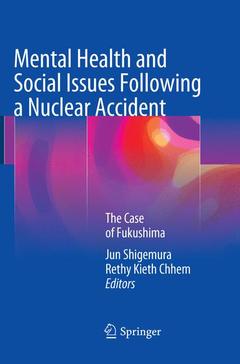Mental Health and Social Issues Following a Nuclear Accident, Softcover reprint of the original 1st ed. 2016 The Case of Fukushima
Coordonnateurs : Shigemura Jun, Chhem Rethy Kieth

This book focuses on mental health issues arising in the wake of the Fukushima nuclear disaster. Three years after the 11 March 2011 Great East Japan Earthquake, tsunamis, and Fukushima Daiichi nuclear accident, roughly 130,000 individuals continue to face enormous burdens as a result of mandatory evacuation. Many evacuees still live in temporary housing, and returning home remains a distant dream as they wait for the decontamination of the danger zone to be completed. However, the plant recovery process is still evolving, and the complete cleanup will take decades. Beyond all of these hardships, many evacuees are also mourning the loss of their loved ones. The compound disaster with its many uncertainties poses and will continue to pose serious emotional and social challenges. People affected by the nuclear disaster have been facing serious psychological challenges from ongoing fear of radiation exposure. Furthermore, there is continuing debate between various stakeholders on the options for disaster responses. This situation in turn produces adverse public responses, such as discrimination and stigmatization of the evacuees and scapegoating of the authorities and nuclear plant workers. Mental Health and Social Issues Following a Nuclear Accident addresses these issues and their impacts, pursuing both evidence-based and narrative-based approaches. It also contrasts the Fukushima findings with those of other nuclear disasters, namely, Three Mile Island and Cher
nobyl.Foreword.- Preface.- 1. Godzilla mon amour: the Origins and Legacy of Nuclear Fear in Japan.- 2. Unforeseeable Accidents from the Point of View of the Legal System.- 3. Report on Fukushima Counseling Support Professional Team: Interdisciplinary Team Approach for Psychosocial Care of Evacuees.- 4. Societal and Ethical Aspects of Radiation Risk Perception.- 5. Thinking Across Disaster.- 6. Emotional Consequences of TMI and Chernobyl: Lessons Learned for Fukushima.- 7. 3/11 and 9/11: A Multi-faceted Investigation of a Survivor Exchange Program.- 8. Psychosocial Responses to Disaster and Exposures: Distress Reactions, Health Risk Behavior, and Mental Disorders.- 9. Psychosocial Challenges of the Fukushima Nuclear Plant Workers
Editors:
Jun Shigemura
Department of Psychiatry
National Defense Medical College
Saitama, Japan
Rethy Kieth Chhem
Fukushima Medical University, Fukushima, Japan
Hiroshima University, Hiroshima, Japan
Nagasaki University, Nagasaki, Japan
Date de parution : 03-2019
Ouvrage de 130 p.
15.5x23.5 cm
Date de parution : 12-2015
Ouvrage de 130 p.
15.5x23.5 cm
